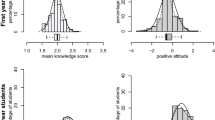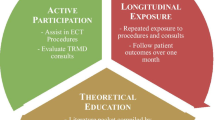Abstract
To examine the impact of the third year psychiatry clerkship on medical students’ knowledge and opinion of ECT at University of Missouri-Columbia School of Medicine. Despite overwhelming evidence of ECT’s efficacy and safety for refractory affective illnesses, (among other conditions), it remains a misunderstood and underutilized intervention. Several studies indicate that ECT stigma and misinformation, unfortunately, does not spare the medical community. Medical students are an optimal group to study, as they are forming their perspectives on different specialties. Few studies have measured the effect of education programs (e.g., clerkships, lectures, observation of ECT) on medical students’ perspectives on ECT.



Similar content being viewed by others
References
Petrides G, Fink M, Husain MM, Knapp RG, Rush AJ, Mueller M, et al. ECT remission rates in psychotic versus nonpsychotic depressed patients: a report from CORE. J ECT. 2001;17(4):244–53.
Dennis NM, Dennis PA, Shafer A, et al. Electroconvulsive Therapy and All-Cause Mortality in Texas, 1998–2013. J ECT. 2017;33(1)
Tørring N, Sanghani SN, Petrides G, Kellner CH, Østergaard SD. The mortality rate of electroconvulsive therapy: a systematic review and pooled analysis. Acta Psychiatr Scand. 2017;135(5):388–97. https://doi.org/10.1111/acps.12721. Epub 2017 Mar 23
Lauber C, Nordt C, Falcato L, Rössler W. Can a seizure help? The public's attitude toward electroconvulsive therapy. Psychiatry Res. 2005;134(2):205–9.
McDonald A, Walter G. The Portrayal of ECT in American Movies. J ECT. 2001;14(4)
Filkowski MM, Mayberg HS, Holtzheimer PE. “Considering Eligibility for Studies of Deep Brain Stimulation for Treatment-Resistant Depression Insights from a Clinical Trial in Unipolar and Bipolar Depression.” J ECT 32 (2), 2016.
Clothier JL, Freeman T, Snow L. Medical Student Attitudes and Knowledge about ECT. J ECT. 2001;17(2)
Gazdag G, Kocis-Ficzere N, Tolna J. Hungarian Medical Students' Knowledge About and Attitudes toward Electroconvulsive Therapy. J. ECT. 21(2), 2005.
McFarquhar TF, Thompson J. Knowledge and attitudes regarding electroconvulsive therapy among medical students and the general public. J ECT. 2008;24(4):244–53.
Andrade C, Kumar Rao NS. Medical Students' Attitudes toward Electroconvulsive Therapy: An Indian Perspective. Convuls Ther. 1996;12(2)
Walter G, McDonald A, Rey JM, Rosen A. Medical Student Knowledge and Attitudes Regarding ECT Prior to and After Viewing ECT Scenes from Movies. J ECT. 2002;18(1)
Trenton A, Pelchat R. Medical Students’ Perceptions of Electroconvulsive Therapy The Impact of Direct Exposure. J ECT. 2016;32(1)
Warnell RL, Duk AD, Christison GW, Haviland MG. Teaching Electroconvulsive Therapy to Medical Students: Effects of Instructional Method Knowledge and Attitudes. Acad Psychiatry. 2005;29(5)
Erden AO, Sertac AK, Emera SY, Demir B. Knowledge of and Attitudes Toward Electroconvulsive Therapy Among Medical Students, Psychology Students, and the General Public. J ECT. 2013;29(1):45–50.
Shah N, Averill PM. Third-Year Medical Students' Understanding, Knowledge, and Attitudes toward the Use of Electroconvulsive Therapy. J ECT. 2009;25(4)
Bo J, Omoaregba OJ, Igberase OO, Olotu SO. Unmodified Electroconvulsive Therapy: Changes in Knowledge and Attitudes of Nigerian Medical Students. Afr Health Sci. 2009;9(4)
Sienaert P. Based on a True Story? The Portrayal of ECT in International Movies and Television Programs. Brain Stimul. 2016;9(6):882–91.
Pranjkovic T, Degmecic D, Flajsman AM, et al. Observing Electroconvulsive Therapy Changes Students; Attitudes, A Survey of Croatian Medical Students. J ECT. 2017;33(1)
Byrne P, Cassidy B, Higgins P. Knowledge and Attitudes toward Electroconvulsive Therapy Among Health Care Professionals and Students. J ECT. 2006;22(2)
Papakosta VM, Zervas IM, Pehlivanidis A, Papadimitriou GN, Papakostas Y. A Survey of the Attitudes of Greek Medical Students towards Electroconvulsive Therapy. J ECT. 2005;21(3)
Choy MA, Farber KG, Kellner CH. Electroconvulsive Therapy (ECT) in the News: Balance Leads to Bias. J ECT. 2017;33(1)
Abbas M, Mashrai N, Mohanna M. Knowledge of and Attitudes toward Electroconvulsive Therapy of Medical Students in the United Kingdom, Egypt, and Iraq: A Transcultural Perspective. J ECT. 2007;23(4)
Author information
Authors and Affiliations
Corresponding author
Ethics declarations
All procedures performed in studies involving human participants were in accordance with the ethical standards of the institutional and/or national research committee and with the 1964 Helsinki declaration and its later amendments or comparable ethical standards.
Conflict of Interest
The authors declare that they have no conflict of interest.
Ethical Approval
In case animals were involved: This article does not contain any studies with animals performed by any of the authors.
In case humans are involved: Informed consent; All individual participants included in the study were provided an “Opt out” form to decline participation.
Rights and permissions
About this article
Cite this article
Ithman, M., O’Connell, C., Ogunleye, A. et al. Pre- and Post-Clerkship Knowledge, Perceptions, and Acceptability of Electroconvulsive Therapy (ECT) in 3rd Year Medical Students. Psychiatr Q 89, 869–880 (2018). https://doi.org/10.1007/s11126-018-9585-4
Published:
Issue Date:
DOI: https://doi.org/10.1007/s11126-018-9585-4




